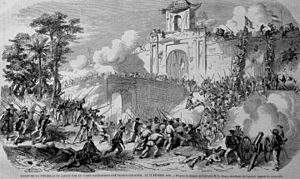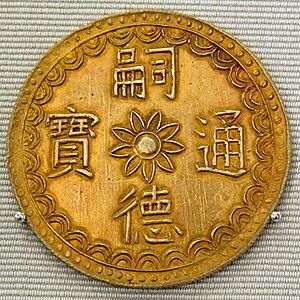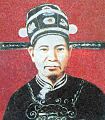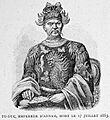Tự Đức facts for kids
Quick facts for kids Emperor Tự Đức嗣德帝 |
|||||||||||||||||
|---|---|---|---|---|---|---|---|---|---|---|---|---|---|---|---|---|---|
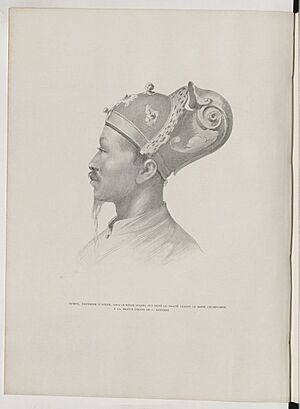
Portrait by L.Ruffier
|
|||||||||||||||||
| Emperor of Đại Nam | |||||||||||||||||
| Reign | 5 November 1847 – 19 July 1883 | ||||||||||||||||
| Predecessor | Thiệu Trị | ||||||||||||||||
| Successor | Dục Đức | ||||||||||||||||
| Emperor of the Nguyễn dynasty | |||||||||||||||||
| Reign | 5 November 1847 – 19 July 1883 | ||||||||||||||||
| Predecessor | Thiệu Trị | ||||||||||||||||
| Successor | Dục Đức | ||||||||||||||||
| Born | 22 September 1829 Imperial City, Huế, Đại Nam |
||||||||||||||||
| Died | 19 July 1883 (aged 53) Imperial City, Huế, Đại Nam |
||||||||||||||||
| Burial | Khiêm Lăng | ||||||||||||||||
| Spouse | Empress Trang Ý Nguyễn Thị Bích more than 300 concubines |
||||||||||||||||
| Issue | None (childless) Nguyễn Phúc Ưng Ái (adoptive) Nguyễn Phúc Ưng Kỷ (adoptive) Nguyễn Phúc Ưng Đăng (adoptive) |
||||||||||||||||
|
|||||||||||||||||
| House | Nguyễn dynasty | ||||||||||||||||
| Father | Thiệu Trị | ||||||||||||||||
| Mother | Empress Từ Dụ | ||||||||||||||||
| Religion | Ruism, Buddhism | ||||||||||||||||
Tự Đức (born Nguyễn Phúc Hồng Nhậm, also Nguyễn Phúc Thì) was the fourth emperor of the Nguyễn dynasty in Vietnam. He ruled from 1847 to 1883. His name Tự Đức means "inheritance of virtues." He was the last independent ruler of Vietnam before it became a French colony.
Contents
Biography
Prince Nguyễn Phúc Hồng Nhậm was born on September 22, 1829. He was a son of Emperor Thiệu Trị. In 1847, he became emperor of Vietnam, taking the name Tự Đức. His father had chosen him over his older brother, Hồng Bảo. Tự Đức was known for following Confucianism strictly. He also did not like foreigners or new ideas. This choice caused some problems at the start of his rule. Many people were unhappy with the Nguyễn family's rule.
Emperor Tự Đức's Rule
Dealing with Disasters
In the summer of 1849, a year after Tự Đức became emperor, a serious cholera epidemic hit Vietnam and Cambodia. About 600,000 people died from this disease. Some experts believe the total number of affected people was even higher.
Vietnam also faced many natural disasters during Tự Đức's reign. There were very heavy rainy seasons from 1847 to 1861. After that, there were severe droughts between 1864 and 1889. Strong typhoons hit northern Vietnam in 1880 and 1881. In 1854, a large group of locusts destroyed crops in some provinces.
Family Conflicts
Prince Hồng Bảo, Tự Đức's older brother, was upset that he was not chosen as emperor. He planned a rebellion against Tự Đức. Many different groups supported him. These included Confucian scholars, supporters of the old Posterior Lê dynasty, and even Catholic missionaries. Peasants who were unhappy with taxes also joined.
However, Hồng Bảo was arrested in 1854 before he could start his rebellion. He died in prison. Later, in 1866, Hồng Bảo's son, Đinh Đạo, rebelled against Tự Đức. This rebellion was stopped. Tự Đức ordered Đinh Đạo, his brothers, and his mother to be put to death.
Religious Suppression
Emperor Tự Đức continued his ancestors' policies. He kept Vietnam closed off from other countries. He also refused to modernize the country. While he was a gentle and educated person in his private life, his policies led to conflicts with European nations.
He treated all foreigners in Vietnam harshly. This was especially true for Christians. He called their religion a "perverse doctrine." He believed they had tried to overthrow his grandfather in the Lê Văn Khôi revolt. A Christian official named Nguyễn Trường Tộ tried to tell Tự Đức that his policies were dangerous. But Tự Đức did not listen. He thought France was too busy with problems in Europe to react. He was wrong.
-
Théophane Vénard, French Catholic missionary was executed by Tự Đức in 2/2/1861.
Attempts at Reforms
Even though Tự Đức was against Catholics, some Catholic officials served in his court. One of them, Nguyễn Hữu Thơ, was a priest. Tự Đức sent him to France to plan a school for "Sciences, Arts and Crafts" in Huế. But Tự Đức soon lost interest, and the project was stopped.
Another Catholic official, Nguyễn Trường Tộ, tried many times to convince Tự Đức to update the kingdom. He wanted Vietnam to join the changing world. In 1866, he went to Europe to find technicians and teachers for a Western-style school. But this project was also canceled in 1867.
Nguyễn Trường Tộ also argued against the old Confucian education system. He said it had harmed China and Vietnam. He wanted a new, modern education system like those in Europe. However, none of his ideas were put into action.
Some historians say that Emperor Tự Đức did order Chinese versions of Western science books to be read. One example is "Vạn Quốc Công Pháp," a Chinese translation of "The Elements of International Law." This book helped change how leaders in China and Japan thought. But in Vietnam, new Western ideas were adopted very slowly. The leaders were often unwilling to change.
Invasions by Chinese Rebels
Northern Vietnam, called Tonkin, suffered from cholera, natural disasters, and famines in the 1840s and 1850s. The government had little control over the mountainous areas. Rebellions and pirate activities grew. In 1857, Chinese Muslim rebels from Yunnan attacked areas near Tụ Long mines. These mines were important for Vietnam's economy.
In 1860, these rebels were pushed back. But then the White Flag army invaded Tonkin. They took over Tụ Long by 1863, which hurt Vietnam's money system. The White Flags caused more trouble. In 1862, Tự Đức appointed Nguyễn Bá Nghi to fight them. The White Flags raided many areas, making local governments unable to work. In 1865, they ambushed Vietnamese troops, killing many soldiers.
Since they could not defeat the White Flags easily, the Vietnamese began to hire Chinese and Tai-Zhuang fighters. In 1860, a Chinese merchant named He Junchang hired his own fighters. This private army successfully drove the White Flags away from Lào Cai.
Another group, the Black Flag Army, was formed by Liu Yongfu in 1865. They were Chinese and Tai-Zhuang fighters. Vietnam quickly made an alliance with the Black Flags to fight the White Flags. In 1868, the Black Flags defeated the White Flags. Vietnam then supported the Black Flags because they were good fighters.
New Chinese rebels, called the Yellow Flag Army, also invaded Vietnam. In March 1868, thousands of Yellow Flags crossed the border. They attacked local Vietnamese officials and raided food storage places. The Yellow Flags controlled large parts of Tonkin until 1885.
European Conquest
France and Spain reacted to Tự Đức's harsh treatment of Christians. They sent a large military force and attacked southern Vietnam from 1858 to 1862. The Vietnamese army fought bravely. However, their old weapons and fighting methods were no match for the French. The French suffered more from the climate and diseases than from the Vietnamese army.
Fighting continued around Hanoi in the 1880s against the Black Flag pirates. France won these battles. The Qing Empire then gave up its power over Vietnam. It recognized France as the ruling power in the region.
Internal Rebellions
Emperor Tự Đức also had to deal with many internal rebellions. There were hundreds of small uprisings against his rule. His attempts to stop Christian missionaries were a big problem. For example, he ordered all Vietnamese Catholics to give up their religion in 1848. If they refused, they would be marked as heretics and lose their rights. This made European powers angry and made it harder for Vietnam to get help from other countries.
Treaties with Foreign Powers
As the French advanced on the capital, Tự Đức faced more rebellions. He feared losing his power. He decided to make a deal with the French. He thought it was better to give up some land to the French than to be overthrown by rebels. He signed away the southernmost part of Vietnam, Cochinchina, to become a French colony. He also accepted that Vietnam would become a French protectorate.
This decision caused a huge uproar. Many people, like the famous official Trương Định, refused to accept the treaty. They continued to fight for their country. They criticized Tự Đức for giving away any part of their homeland.
-
Hoàng Diệu, who was the viceroy of Hanoi, died in 1882 after his defensive failure in Battle of Hanoi to France.
-
Phan Liêm, son of Phan Thanh Giản was captured by French colonel Francis Garnier in 1873 and released in 1874 after peace treaty.
-
Phạm Thận Duật who signed the Treaty of Huế (1884) and later he joined the anti-French resistance. He was the private tutor of future emperor Dục Đức and Đồng Khánh.
After an event in Tonkin in 1873, France and Vietnam signed the treaty of Saigon (1874). This treaty made Vietnam a vassal of France. However, it allowed Vietnam to keep its foreign relationships. But in 1876, Tự Đức sent a group to Beijing. This showed that Vietnam still saw itself as a tributary state to the Chinese Empire. Another Vietnamese group went to China in 1880. In November 1880, the Chinese ambassador in Paris said that Vietnam was still a Chinese vassal. He rejected the 1874 treaty with France. The next year, China sent a representative to Vietnam to discuss trade.
Siam (now Thailand) and Vietnam also renewed their relationship in 1878. In 1880, Tự Đức welcomed an Italian trade group. France was annoyed by Tự Đức's actions. As a result, France stopped Vietnam from joining the Paris International Fair. They also prevented Vietnam from sending a representative to congratulate President Jules Grévy.
By September 1882, over 200,000 Chinese troops had been sent to Northern Vietnam. This happened because Tự Đức asked for their help to fight against new French attacks.
Death
Emperor Tự Đức died in 1883. He did not live to see the worst effects of colonialism on his country. He was the last Vietnamese monarch to rule independently. He had no children, even though he had many wives. His adopted son, Dục Đức, became emperor after him. But Dục Đức was removed from power by court officials after only three days.
Family
| Rank | Title | Name | Date of birth–death | Note |
|---|---|---|---|---|
| Consort Trung | Palace lady
Second rank Consort Cần First rank Consort Thuần/Trung The imperial noble consort (the same as The empress of Nguyễn dynasty) Empress Khiêm Empress dowager Trang Ý Grand Empress dowager Trang Ý Empress Lệ Thiên Anh (Lệ Thiên Anh Hoàng hậu- 儷天英皇后) |
Võ Thị Duyên | 1828–1903 | |
| Consort Thiện | Palace lady
Second rank consort Chiêu First rank Consort Thiện |
Nguyễn Thị Cẩm | ||
| Consort Học | Palace lady
Fourth rank concubine Lượng Second rank consort Khiêm First rank consort Học The imperial consort dowager (the title of the emperor's mother but not the empress of the former emperor) |
Nguyễn Thị Hương | ||
| Concubine Mẫn | Palace lady
Third rank Concubine Thận Second rank Consort Cung Third rank concubine Mẫn |
From Lê family | ||
| Concubine Lễ | Ninth rank lady
Eighth rank lady Seventh rank lady Sixth rank lady Third rank concubine Lễ |
Nguyễn Nhược Thị Bích | 1830–1909 | |
| Concubine Thận | Third rank concubine Thận | From Hồ family | ||
| Concubine Kiệm | Fourth rank concubine Kiệm | From Bùi family | ?–1893 | |
| Concubine Tín | Fifth rank concubine Tín | From Nguyễn Thanh family | ||
| Lady | Sixth rank lady | From Nguyễn Trinh family | ||
| Eighth rank lady | From Nguyễn Đình family | |||
| Ninth rank lady | From Nguyễn Nhược family | Concubine Lễ's sister | ||
| Ninth rank lady | Trương Thị Ân | |||
| Ninth rank lady | From Lê Family | |||
| And more with no informations | ||||
See also
- Tự Đức Thông Bảo
- Tự Đức Bảo Sao
 | Shirley Ann Jackson |
 | Garett Morgan |
 | J. Ernest Wilkins Jr. |
 | Elijah McCoy |






